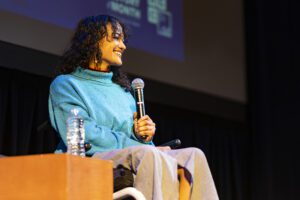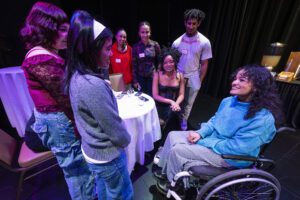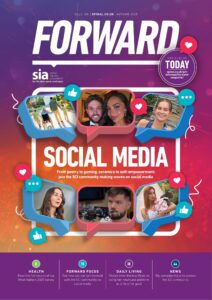Blog
Something Wicked - interview with Marissa Bode (Forward - Autumn 2025)
Wicked movie star Marissa Bode made history last year as the first spinal cord injured actress to play a wheelchair-using character in the show’s history.
As the second instalment – Wicked: For Good – opens in cinemas across the UK in November, the actress shares why her own lived experience of disability brings something unique to the role.
As she adjusts to life as a star of the highest-grossing film adaptation of a Broadway musical ever, Wicked actress Marissa Bode feels a responsibility to use her newfound platform as a force for good.

On social media, Marissa, who sustained a spinal cord injury in a car accident when she was 11, often addresses issues like racism and accessibility for people with disabilities.
“I think people with a large platform should be using it for things like that, especially (on behalf of) people who don’t reach that wide of an audience,” she says. “I think it’s important to uplift those voices to create that kind of change in the world.”
Marissa reprises her role as Nessarose, the disabled sister of Elphaba, the Wicked Witch of the East played by Cynthia Erivo in Wicked: For Good, the second part of the Wicked stage show adaptation which also stars pop icon Ariana Grande.
Speaking during her appearance as part of the University of Wisconsin-Madison’s Black History Month celebration earlier this year, Marissa described herself as “disabled, a woman of colour and queer,” saying that each of those identities is important to her.
Marissa, 24, grew up in Mazomanie, Wisconsin, USA. After graduating from Wisconsin Heights High School, she attended the American Musical and Dramatic Academy in Los Angeles.
Wicked was her first major movie role and Marissa made history as the first actress who uses a wheelchair to play the role. When asked what this groundbreaking role means to her, she said: “I think whatever your identity is coming in to play a role, your lived experience is always going to add a specific layer to that character.”
“Whether you are disabled or whether you are a person of colour, your lived experience in that identity will always add something special and unique to that role,”
She added, “And so I think specifically casting somebody with a disability in a disabled role is very important to add that extra layer because nobody knows us better than us.”

Marissa’s appearance on the college campus brought out many Wicked superfans — or Ozians, as they are called — like student Evan Epps, a psychology and theatre major who has seen the movie five times. As he waited in his seat for the event to start, he listened to the Wicked soundtrack on headphones. He wore a Wicked sweatshirt, a Wicked jacket and Wicked Crocs (yes, a thing!)
“I came prepared. I’m in the mentality,” he said, praising Marissa for advocating for authentic representation in the entertainment industry and for coming back to her home state to talk to college students.
Theatre and drama student Jenny Duarte Castillo, got to meet the actress at a reception prior to the event. It left her tongue-tied and starstruck.
“She’s such a light for young actresses of colour,” she said.
“The big takeaway for me is that I need to continue on this path no matter how hard it might be, knowing that my dreams are possible and that if I keep that drive, I can get there eventually.”
During the audience Q&A, Marissa, who lives in California, was asked about a scene in Wicked where a woman starts to help Nessarose by pushing her wheelchair without asking her first whether she needs help. The incident triggers a major plot point.
Marissa said she is grateful the movie included that scene.

“I understand people’s intention of wanting to help somebody in a wheelchair,” she said. “But touching someone’s disability aid or mobility device without consent is never OK. Unfortunately, I’ve experienced that way too often, especially living in the city, just constantly. It can be scary because I don’t know that person and it feels like an autonomy is being taken away from me.”
The biggest audience reaction came when Marissa was asked if she could share anything about Wicked: For Good. The crowd thrilled at the possibility of getting the inside scoop.
But not wanting to risk an angry call from Universal Pictures, she said she could reveal only that there’s more magic, more character development, and a lot more humanity in part 2.
“That’s all I can say about that”, she added.
Photo credits: Bryce Richter / University of Wisconsin–Madison Black History Month – keynote event held at Shannon Hall in the Memorial Union on Feb. 5, 2025.
*This feature was adapted with kind permission from an original article written by Doug Erickson at the University of Madison-Wisconsin. Read the full article here: Marissa Bode brings ‘Wicked’ star power and a platform of authentic representation to Memorial Union
 This article was featured in the Autumn 2025 issue of FORWARD magazine the only magazine dedicated to the spinal cord injury community.
This article was featured in the Autumn 2025 issue of FORWARD magazine the only magazine dedicated to the spinal cord injury community.